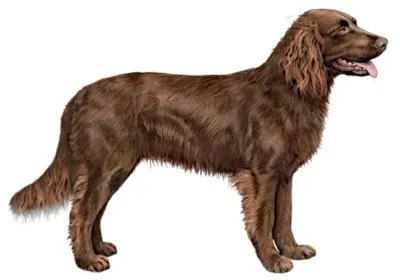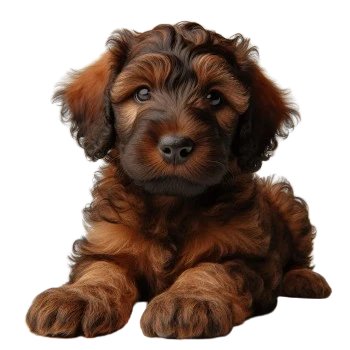
The German Oysel Dog, also known as the German Oysel, is a medium-sized dog breed originating from Germany. Renowned for its agility, intelligence, and lively temperament, this dog has traditionally been used for various work tasks, including hunting and guarding. Its versatility and adaptable nature make it an excellent companion for active families as well as for experienced dog owners.
Physically, the German Oysel Dog is a well-proportioned dog with an athletic build. Males typically stand between 50 and 60 cm at the shoulder, while females stand between 45 and 55 cm. Their weight ranges from 20 to 30 kg. It has a muscular body with a solid frame and a straight back. The head is medium-sized with a slightly rounded skull and a moderately long muzzle. The eyes are oval-shaped, often dark in color, and express marked liveliness and intelligence. The ears are medium-sized, triangular, and naturally erect.
The German Oysel Dog typically stands between 45 and 60 cm at the shoulder, with a weight ranging from 20 to 30 kg. Males are generally larger than females, but both sexes share similar physical characteristics.
The coat of the German Oysel Dog is short, dense, and weather-resistant. It is often in colors such as sable, fawn, or black and tan, with a thick undercoat that allows it to endure various weather conditions. The coat is easy to maintain, requiring regular brushing to remove dead hair and maintain skin health.
In terms of personality, the German Oysel Dog is known for its lively, intelligent, and versatile temperament. It is extremely active and requires plenty of exercise to stay happy and healthy. This dog is also very loyal and protective of its family, making it an excellent guard dog. It can be reserved with strangers but is not aggressive without cause. Early socialization and consistent training are essential to help it develop balanced behavior. With family members, it is affectionate and playful.
The German Oysel Dog is generally healthy, with an average lifespan of 10 to 14 years. Like all breeds, a balanced diet, regular veterinary care, and appropriate exercise are essential for maintaining overall health. It is important to ensure that this dog receives sufficient physical and mental exercise to prevent boredom and behavioral issues. Although generally robust, it may be prone to hip issues or genetic conditions, so regular check-ups are recommended.

The German Spaniel Puppy, also known as Deutscher Wachtelhund, is a versatile breed recognized for its exceptional skills as a hunting dog. Medium-sized, this dog is robust with a dense, wavy coat that offers good protection against the elements. It is intelligent, sociable, and has an excellent work instinct, making it an ideal companion for hunters. Friendly and affectionate, the German Spaniel Puppy gets along well with children and other animals. Early socialization and consistent training are essential to maximize its potential.
The price of a German Spaniel Puppy generally ranges from 900 to 1500 euros, depending on the breeder and lineage. It is advisable to choose a certified breeder to ensure the puppy's health and well-being. Additional costs for vaccinations and spaying/neutering should also be considered when adopting.
The German Spaniel, also known as Deutscher Wachtelhund, is a versatile breed originating from Germany, known for its hunting skills and energetic temperament. Training this breed requires an understanding of its intelligence, endurance, and need for mental and physical stimulation. Here are some tips for training this dynamic breed.
Start training your German Spaniel from a young age. This breed is intelligent and responsive but can be stubborn due to its strong hunting instincts. Use positive reinforcement methods, such as treats and praise, to encourage desired behaviors and maintain its interest.
Socialize your German Spaniel as early as possible. Expose it to different environments, people, and animals to help it develop a balanced and confident attitude. This breed is naturally sociable, but early socialization will enhance its adaptability.
Due to its hunting origins, it is essential to provide it with stimulating activities, such as tracking games or search exercises. These activities help channel its energy and satisfy its natural instincts.
Finally, be patient and consistent in your approach. The German Spaniel needs a calm and confident leader to thrive. Proper training will make it a loyal, energetic, and incredibly skilled hunting companion.